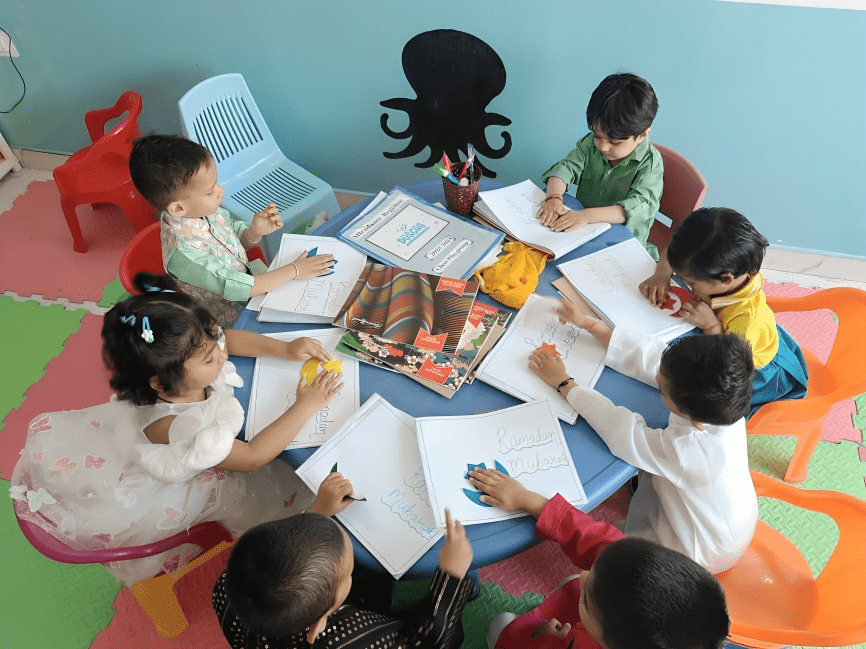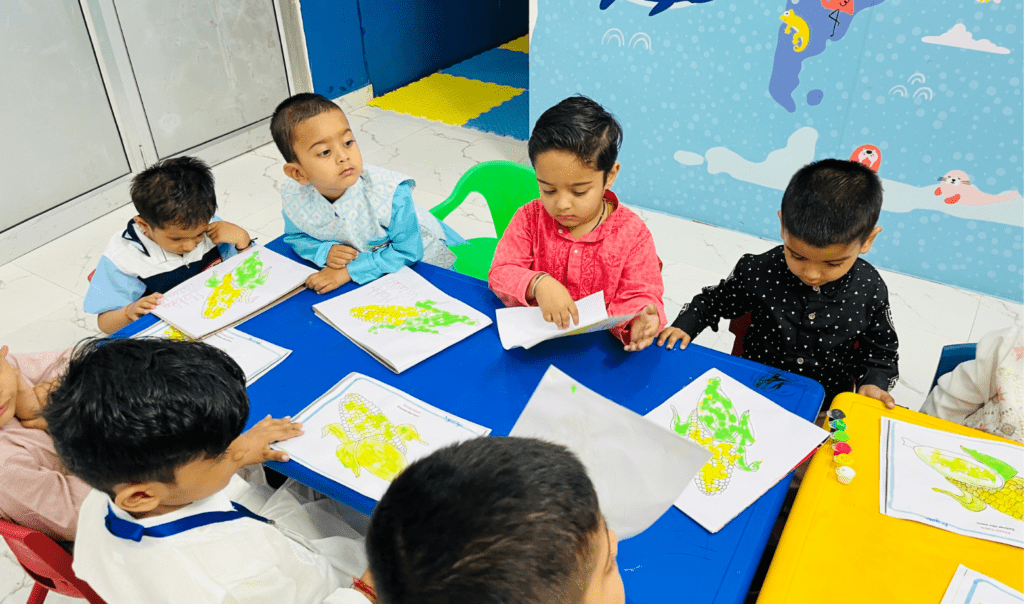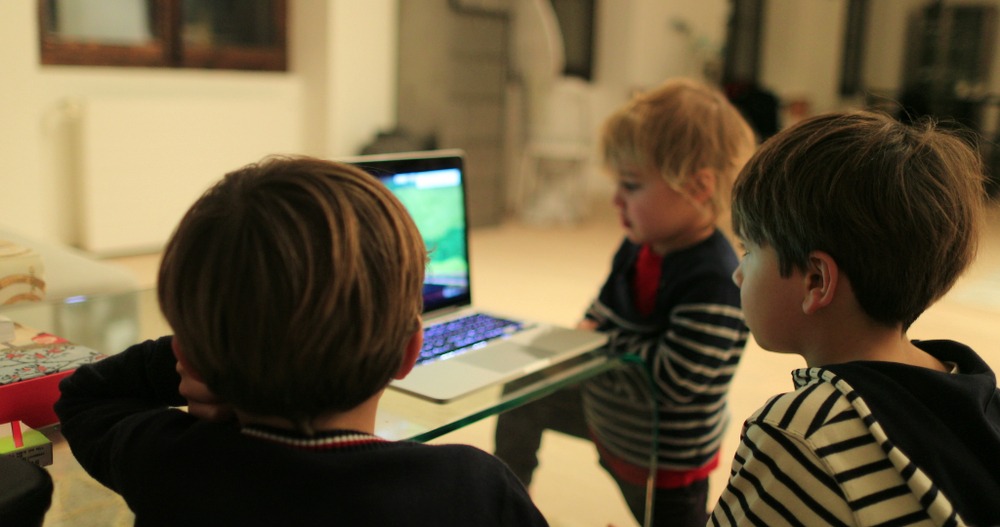Introduction
At Duscha Preschool in Ashiyana, we understand the importance of early brain development. Engaging in brain development games for preschoolers in Ashiyana helps our little learners grow intellectually and socially. This guide will delve into the top 10 games that are not just fun but also crucial for cognitive enhancement.
Top 10 Brain Development Games for Preschoolers
1. Uncover the Tray
Preschoolers can play the traditional memory game Uncover the Tray. We cover a tray with numerous objects that we place on it. We discuss everything again after giving the kids a quick rundown of the items. The youngsters’ task is to name and recall the objects. This game is excellent for enhancing memory and attention, vital components of educational games for preschool brain growth.
What you require: A tray, a variety of small items (about 10-15), a cloth to cover them.
How to play this game: Place the items on the tray and cover them with the cloth. Let your child look at the items for 30 seconds, then cover them again. Ask your child to recall as many items as possible. This game enhances memory and observational skills, making it a fantastic learning game for preschoolers.
Put Together a Jigsaw Puzzle
Jigsaw puzzles are classic learning games for preschoolers that encourage problem-solving and perceptual skills. At Duscha Preschool, we introduce puzzles with varying levels of difficulty, tailored to the developmental stage of each child. This activity not only improves spatial awareness but also enhances fine motor skills as children manipulate the pieces to fit together.
What you require: any jigsaw puzzle suitable for preschoolers.
How to play this game: Scatter the puzzle pieces and encourage your child to fit them together based on the picture on the box. Jigsaw puzzles promote problem-solving skills and improve hand-eye coordination, essential for preschool brain growth.
Color Match
Color matching involves matching colored cards or objects. This simple yet effective game boosts color recognition and critical thinking. It’s a part of our daily activities, aligning with interactive learning games to make learning colors engaging and fun.
What you require: Colored cards or blocks.
How to play this game: Spread out various colored cards or blocks. Ask the children to match the colors by placing the same colors together. This simple game is great for improving color recognition and critical thinking.

Letter Rapid Fire Fun

Rapid recognition of letters and simple words can boost language skills and is one of the essential educational games for preschool brain growth. In “Letter Rapid Fire Fun,” children quickly name letters flashed before them, promoting quick thinking and familiarity with the alphabet—an interactive learning game that keeps them excited and engaged.
What you require: Flashcards with letters or simple words
How to play this game: Show the flashcards to your child and ask them to name the letter or read the word aloud as quickly as possible. This quick-paced game boosts letter recognition and reading speed, which are integral to early literacy.
Story Sequencing Cards
Using cards that depict different parts of a story, children are asked to arrange them in the correct sequence. This activity enhances understanding of narrative structure and encourages critical thinking, making it a great choice among brain development games in Ashiyana.
What you require: A set of cards depicting a simple story.
How to play this game: Shuffle the cards and ask your child to rearrange them to tell the story correctly. This boosts understanding of sequences and logical thinking.
Emoji Games
In the digital age, emojis are not just fun; they are educational! Our Emoji Games involve identifying emotions and expressions portrayed by emojis, helping children understand and communicate feelings more effectively—an essential skill for personal development.
What you require: Cards with different emoji expressions.
How to play this game: Use the emoji cards to play a memory game or ask your child to identify the emotions depicted by the emojis. This helps in understanding emotions and enhances memory, which are key aspects of interactive learning games.
Mapping The Neighborhood
Understanding their environment helps children feel more connected to their community. Mapping the Neighborhood involves creating simple maps of familiar places, which enhances spatial reasoning and teaches basic geography, making it one of the best interactive learning games.
What you require: Paper, crayons, and a recent walk or drive around the neighborhood.
.
How to play this game: After a stroll around the neighborhoods, ask your child to draw a map of the route you took, marking significant landmarks. This activity encourages spatial awareness and memory.
Counting Beads
Counting beads or similar objects help preschoolers learn numbers and basic math. It is a fun way to introduce counting, adding, and subtracting, reinforcing learning games for preschoolers in a practical, hands-on way.
What you require: Beads and strings.
How to play this game: Ask the children to string a specific number of beads, encouraging them to count as they go. This activity is perfect for practicing counting and fine motor skills.
Role Play
Role play stimulates imagination and social skills. Children engage in various roles from doctors to shopkeepers, which teaches them empathy and problem-solving. This method of interactive play is a cornerstone of our learning approach at Duscha.
What you require: Various costumes, props, and a theme.
How to play this game: Set a scene and let the children act out different roles. This helps in developing language skills, empathy, and creativity essential for interactive learning games.
Finger Painting
Lastly, Finger Painting is not just about creating art; it’s a sensory game that aids in brain development by mixing colors, creating shapes, and storytelling through patterns. It stimulates creativity and motor skills, offering a tactile experience that supports cognitive growth and expression.
What you require: Non-toxic paint, paper, and a safe, mess-friendly space.
How to play this game: Let the children use their fingers to paint on paper, encouraging them to express their thoughts and feelings through colors and shapes. This activity is excellent for sensory development and creativity.
Conclusion
At Duscha Preschool in Ashiyana, we believe that learning should be an adventure filled with joy and discovery. By incorporating these top 10 brain development games for preschoolers in Ashiyana, we are setting the foundation for a lifetime of learning. These games not only enhance cognitive skills but also foster social and emotional development, ensuring our children grow to be well-rounded individuals.
Here are just a few of the programs we offer at Duscha PreSchool & Day Care:
- No Tuition Fee Hike for the Next Academic Session
- Modern Preschool Technology-Oriented Infrastructure
- Air-Conditioned Smart Classes
- Safe Pickup and Drop Facility
- Montessori Way of Learning
- Dedicated Computer Labs and Library
- Quarterly Health Check-up Camp for Duscha Students
- Experienced Teachers
- Affordable Fees
At Duscha PreSchool & Day Care, we understand that every child is unique, and we strive to create a learning environment that is tailored to their individual needs. Our experienced staff works closely with parents to ensure that each child receives the support and attention they need to thrive.
So if you’re looking for the best kids school in Ashiyana, Lucknow, look no further than Duscha PreSchool & Day Care. With our commitment to excellence, individualized attention, and top-notch educational programs, we are the best choice for parents who want to give their children a strong foundation in education.
But don’t just take our word for it – come see for yourself! Schedule a tour of our air-conditioned play school in Lucknow today, and discover why Duscha PreSchool & Day Care is the best school in Ashiyana, Lucknow.
Frequently Asked Questions
Brain development games are suitable for all ages, but they can be especially beneficial for children as young as three years old. At this age, children are starting to learn how to solve problems and think critically. Games that encourage these skills can help enhance their cognitive development. For older children and adults, these games can help maintain and improve brain function, support memory, and aid in problem-solving skills.
Games that promote brain development are important for early schooling because they help kids learn in an enjoyable and interesting way. These games aid in the development of critical thinking, memory, and problem-solving abilities in young children. Children can develop their ability to follow instructions and extend their attention span by engaging in these games. Furthermore, by providing entertaining experiences, these activities foster creativity and aid children’s understanding of arithmetic, language, and science subjects.
Like memory games and puzzles, brain development games test the mind. By using these abilities, they improve your ability to think and recall. Regularly engaging in these games can enhance your memory, focus, and ability to solve problems. This is because they provide enjoyable and interesting cognitive stimulation.
Children should engage in brain development activities daily. Activities like puzzles, reading, and educational games help boost cognitive skills. Regular practice enhances memory, problem-solving abilities, and overall brain function, supporting healthy growth and learning in children.



